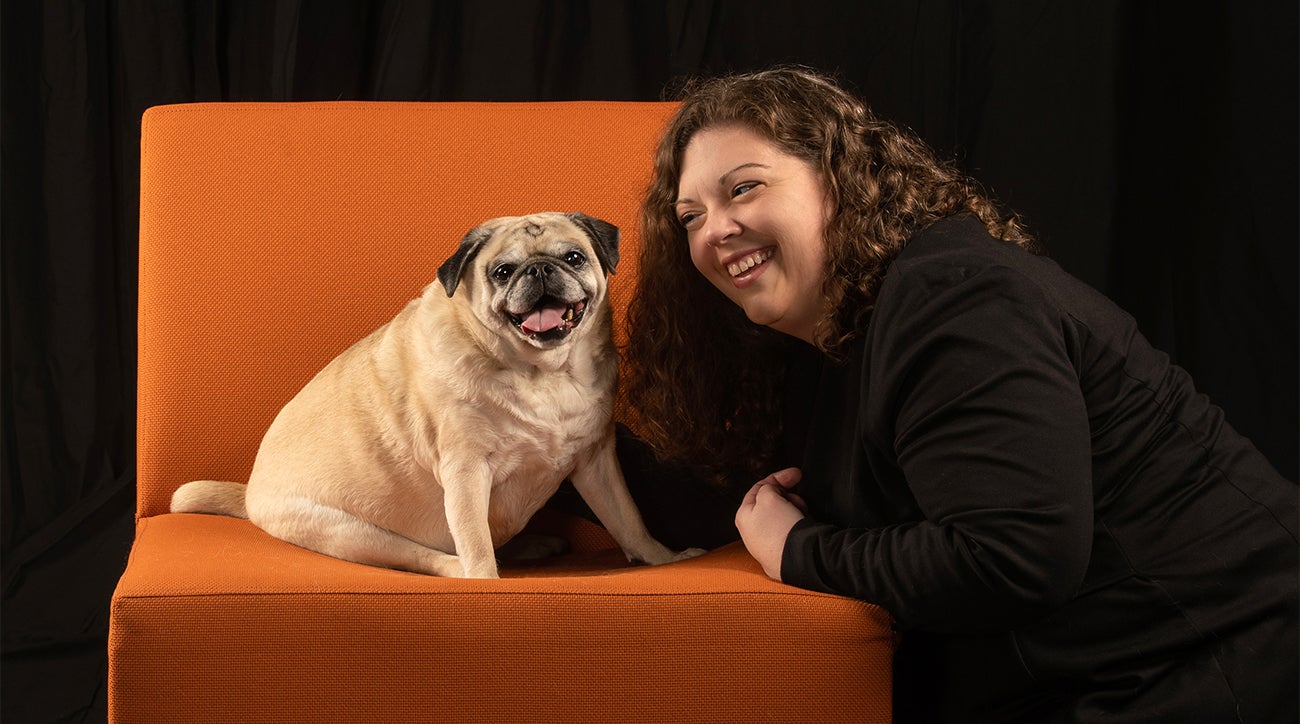
Have you ever seen this bumper sticker: “My child is a Labrador”? While it is not quite meant to be taken literally, this tongue-in-cheek sticker touches upon a fascinating phenomenon in modern society.
For various reasons ranging from personal expenses and economics, to greater reproductive autonomy in women, to concerns about the impact of childbearing in terms of the environment and global overpopulation, many humans are choosing not to have children. Instead, they are using their parenting skills to care for pets.
But why?
Shelly Volsche, an anthropology lecturer, has studied this phenomenon of pet parenting for years, mainly with humans and their dogs.

As Volsche’s research in Boise State’s Evolutionary Connections of Humans and Other Species Lab reveals, there is no single answer to such a complex question. One element is that humans and canines have evolved together for longer than any other pairing, and in fact dogs’ ancestors, wolves, have more similar family styles to humans than earlier theory would lead one to believe.
Canine Cognition Studies
In recent decades, evolutionary science research conducted by scholars such as Brian Hare of Duke University and Sarah Hrdy, professor emerita at the University of California-Davis, has changed the way scientists view and compare the cognitive and parenting abilities of other species. This research was pivotal for Volsche as a young scholar.
“Brian Hare came out with a paper that showed dogs can succeed at following our hands’ pointing, our communication systems, better than our closest cousins the chimpanzees,” Volsche said.
Hare’s work shattered misconceptions and helped shape the question that is at the heart of Volsche’s research.
“Why do we parent pets? Why dogs? Is there some underlying evolutionary thing that makes it easy for us to attach to each other?” Volsche asked.
Pet-parenting Patterns
There is no denying that humans and dogs share a special bond. When crises hit, humans often reach out to pets for comfort. When COVID-19 swept the nation in early 2020, animal shelters across the country emptied as people adopted pets and enrolled in animal fostering programs to battle the isolation of social distancing and working from home.
While research in the 1980s suggested that pet parenting was an unconscious response to not having children, Volsche believes that pet parenting is a conscious, evolutionary decision.
In recently published observations of male and female dog owners at a dog park in Las Vegas, Volsche uncovered multiple intriguing trends. Female dog owners were more likely to whisper and baby-talk their dogs, while men were more likely to leave their dog off the leash and encourage the dog to do tricks and display its training. Young adults were also more likely than older dog owners to scold or jerk their dogs’ leashes. What is fascinating about these patterns is that they mirror published research on human parenting behaviors.
The discovery that pet owners of different genders parent their dogs differently adds an additional layer of complexity to the question of why humans are assuming parental roles in relation to their pets.
All of this research may raise a larger question: What does the trend toward pet parenting mean in a society that has traditionally considered childbearing one of the culminating experiences of adulthood?
What’s next for Volsche?
Volsche and her colleagues recently received a grant from the Culture & Animals Foundation. They are working to contextualize historical animal behavior research and propose new ways of citing and teaching work that would no longer be deemed ethical. “For example, many people still teach and cite Pavlov, and rightly so,” Volsche said. “Classical conditioning is a key concept in learning theory. However, few acknowledge how inhumane his work was, nor do most of the citations recognize individual animals.”
This contrasts sharply, Volsche added, with our changing ethics and current researchers like Gregory Berns, a distinguished professor of neuroeconomics at Emory University, who writes memorials on Twitter to individual animals.
Pandemic Puppies?
The human-canine bond was strong during the pandemic. It even inspired a new term, “pandemic puppy,” as animal shelters across the U.S. saw their adoption rates climb. The Idaho Humane Society, pictured here, is fortunate to see steady adoption rates throughout the year.